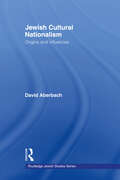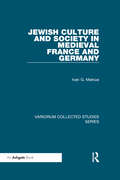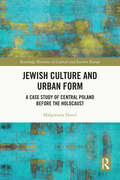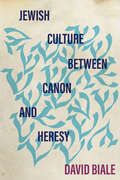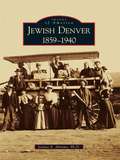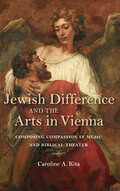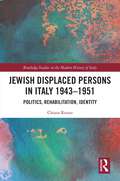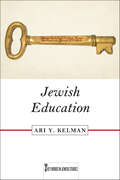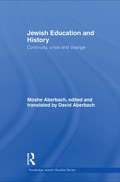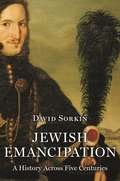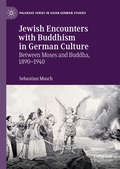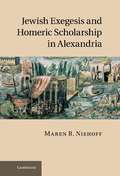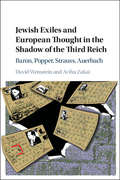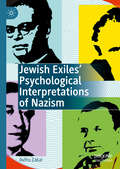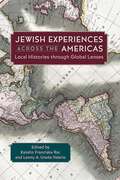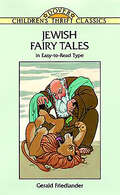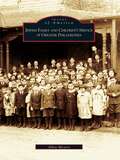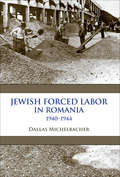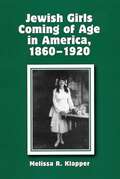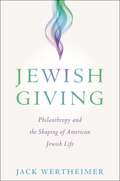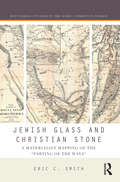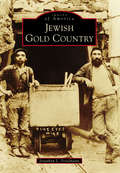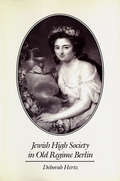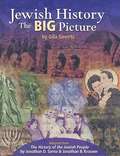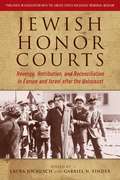- Table View
- List View
Jewish Cultural Nationalism: Origins and Influences (Routledge Jewish Studies Series)
by David AberbachJewish Cultural Nationalism explores the development of Jewish nationalism from the Bible to modern times, focusing on particular movements and places as well as texts which signified, or themselves brought about, change: the Bible (Hebrew prayer book), and the modern Hebrew literature, particularly in Tsarist Russia. While the influence of the Hebrew Bible alone on nationalism in individual periods has been subject to much scholarly study, the present work is unusual in its emphasis on the continuity of Jewish cultural nationalism and its influences through Hebrew texts.
Jewish Culture and Society in Medieval France and Germany
by Ivan G. MarcusThese studies explore the history of the Jewish minority of Ashkenaz (northern France and the German Empire) during the High Middle Ages. Although the Jews in medieval Europe are usually thought to have been isolated from the Christian majority, they actually were part of a 'Jewish-Christian symbiosis.' A number of studies in the collection focus on Jewish-Christian cultural and social interactions, the foundations of the community ascribed to Charlemagne, and especially on the fashioning of a martyrological collective identity in 1096. Even when Jews resisted Christian pressures they often did so by internalizing Christian motifs and turning them on their heads to argue for the truth of Judaism alone. This may be seen especially in the formation of Jews as martyrs, a trope that places Jews as collective Christ figures whose suffering brings about vicarious atonement. The remainder of the studies delve into the lives and writings of a group of Jewish ascetic pietists, Hasidei Ashkenaz, which shaped the religious culture of most European Jews before modernity. In Sefer Hasidim (Book of the Pietists), attributed to Rabbi Judah the Pietist of Regensburg (d. 1217), one finds a mirror of everyday Jewish-Christian interactions even while the author advances a radical view of Jewish religious pietism.
Jewish Culture and Urban Form: A Case Study of Central Poland before the Holocaust (Routledge Histories of Central and Eastern Europe)
by Małgorzata HanzlAcross a range of disciplines, urban morphology has offered lenses through which we can read the city. Reading the urban form, when conflated with ethnographic studies, enables us to return to past situations and recreate the long-gone everyday life. Urbanscapes – the artefacts of urban life – have left us the story portrayed in the pages of this book. The notions of time and space contribute to depicting the Jewish-Polish culture in central Poland before the Holocaust. The research proves that Jewish society in pre-Holocaust Poland was an example of self-organising complexity. Through bottom-up activities, it had a significant impact on the unique character of the spaces left behind. Several features confirm this influence. Not only do the edifices, both public and private, convey meanings related to the Jewish culture, but public and semi-private space also tell the story of long-gone social situations. The specific atmosphere that still lingers there recalls the long-gone Jewish culture, with the unique settlement patterns indicating a separate spatial order. The Author reveals to the international cast of practitioners and theorists of urban and Jewish studies a vivid and comprehensive account. This book will appeal to researchers and students alike studying Jewish communities in Poland and Jewish-Polish society and urbanisation, as well as all those interested in Jewish-Polish Culture.
Jewish Culture between Canon and Heresy (Stanford Studies in Jewish History and Culture)
by David BialeThis career-spanning anthology from prominent Jewish historian David Biale brings over a dozen of his key essays together for the first time. These pieces, written between 1974 and 2016, are all representative of a method Biale calls "counter-history": "the discovery of vital forces precisely in what others considered marginal, disreputable and irrational." The themes that have preoccupied Biale throughout the course of his distinguished career—in particular power, sexuality, blood, and secular Jewish thought—span the periods of the Bible, late antiquity, and the Middle Ages to the twentieth century. Exemplary essays in this volume argue for the dialectical relationship between modernity and its precursors in the older tradition, working together to "brush history against the grain" in order to provide a sweeping look at the history of the Jewish people. This volume of work by one of the boldest and most intellectually omnivorous Jewish thinkers of our time will be essential reading for scholars and students of Jewish studies.
Jewish Denver: 1859-1940 (Images of America)
by Jeanne E. AbramsIn 1859, during the Pike's Peak gold rush, at least 12 Jews joined the great migration to Colorado in search of gold and a brighter future. The unpredictability of mining and a growing demand for supplies encouraged many of these Jewish settlers to establish small businesses in Denver and in towns and mining camps across the state. By the early 1870s, Jewish benevolent societies and a congregation were established. Denver's dry, mild climate attracted patients with tuberculosis, and two Jewish sanatoriums were opened in the city around the beginning of the 20th century. Many of the predominantly Eastern European Jews who came in search of better health made Denver their home, thus augmenting the early Jewish population significantly. Today Jewish life flourishes in Colorado, and Jewish citizens continue to play a vital role in its culture and development.
Jewish Difference and the Arts in Vienna: Composing Compassion in Music and Biblical Theater (German Jewish Cultures)
by Caroline A. KitaThis study “brings to life a circle of writers and composers, with analyses of their major, minor . . . and forgotten works of Jewish music theater” (Abigail Gillman, author of Viennese Jewish Modernism).During the mid-19th century, the works of Arthur Schopenhauer and Richard Wagner sparked an impulse toward German cultural renewal and social change that drew on religious myth, metaphysics, and spiritualism. The only problem was that their works were deeply antisemitic and entangled with claims that Jews were incapable of creating compassionate art. By looking at the works of Jewish composers and writers who contributed to a lively and robust biblical theatre in fin de siècle Vienna, Caroline A. Kita shows how they reimagined myths of the Old Testament to offer new aesthetic and ethical views of compassion.These Jewish artists, including Gustav Mahler, Siegfried Lipiner, Richard Beer-Hofmann, Stefan Zweig, and Arnold Schoenberg, reimagined biblical stories through the lens of the modern Jewish subject to plead for justice and compassion toward the Jewish community. By tracing responses to antisemitic discourses of compassion, Kita reflects on the explicitly and increasingly troubled political and social dynamics at the end of the Habsburg Empire.
Jewish Displaced Persons in Italy 1943–1951: Politics, Rehabilitation, Identity (Routledge Studies in the Modern History of Italy)
by Chiara RenzoThis book focuses on the experiences of thousands of Jewish displaced persons (DPs) who lived in refugee camps in Italy between the liberation of the southern regions in 1943 and the early 1950s, waiting for their resettlement outside of Europe. It explores the Jewish DPs’ daily life in the refugee camps and what this experience of displacement meant to them. This book sheds light on the dilemmas the Jewish DPs faced when reconstructing their lives in the refugee camps after the Holocaust and how this challenging process was deeply influenced by their interaction with the humanitarian and political actors involved in their rescue, rehabilitation, and resettlement. Relating to the peculiar context of post-fascist Italy and the broader picture of the postwar refugee crisis, this book reveals overlooked aspects that contributed to the making of an incredibly diverse and lively community in transit, able to elaborate new paradigms of home, belonging and family.
Jewish Education (Key Words in Jewish Studies)
by Ari Y KelmanMost writing about Jewish education has been preoccupied with two questions: What ought to be taught? And what is the best way to teach it? Ari Y Kelman upends these conventional approaches by asking a different question: How do people learn to engage in Jewish life? This book, by centering learning, provides an innovative way of approaching the questions that are central to Jewish education specifically and to religious education more generally. At the heart of Jewish Education is an innovative alphabetical primer of Jewish educational values, qualities, frameworks, catalysts, and technologies which explore the historical ways in which Jewish communities have produced and transmitted knowledge. The book examines the tension between Jewish education and Jewish Studies to argue that shifting the locus of inquiry from “what people ought to know” to “how do people learn” can provide an understanding of Jewish education that both draws on historical precedent and points to the future of Jewish knowledge.
Jewish Education and History: Continuity, crisis and change (Routledge Jewish Studies Series)
by Moshe AberbachMoshe Aberbach (1924-2007) was a leading educator and scholar in Jewish studies, specialising in the field of Jewish education in the talmudic period. This book draws on a representative selection of his writings over a fifty year period, and includes essays on Saadia Gaon and Maimonides, coverage of biblical and talmudic studies, and discussions of the roots of religious anti-Zionism and of the Lubavitch messianic movement in the context of similar movements in Jewish history. Focusing on the history of Jewish education and linking the Roman destruction of the Jewish state in 70 CE with Jewish survival after the Holocaust, and how survival of both depended on a strong system of education and the moral example set by teachers, the book explores the vital importance of education to Jewish survival from biblical times to the present. The book includes an autobiographical memoir of Moshe Aberbach’s childhood in Vienna, as well as a biographical Foreword by his son, David. It will be of great interest to Bible scholars and students of Jewish Studies, History, the Holocaust and Jewish social psychology.
Jewish Emancipation: A History Across Five Centuries
by David SorkinThe first comprehensive history of how Jews became citizens in the modern worldFor all their unquestionable importance, the Holocaust and the founding of the State of Israel now loom so large in modern Jewish history that we have mostly lost sight of the fact that they are only part of—and indeed reactions to—the central event of that history: emancipation. In this book, David Sorkin seeks to reorient Jewish history by offering the first comprehensive account in any language of the process by which Jews became citizens with civil and political rights in the modern world. Ranging from the mid-sixteenth century to the beginning of the twenty-first, Jewish Emancipation tells the ongoing story of how Jews have gained, kept, lost, and recovered rights in Europe, North Africa, the Middle East, the United States, and Israel.Emancipation, Sorkin shows, was not a one-time or linear event that began with the Enlightenment or French Revolution and culminated with Jews' acquisition of rights in Central Europe in 1867–71 or Russia in 1917. Rather, emancipation was and is a complex, multidirectional, and ambiguous process characterized by deflections and reversals, defeats and successes, triumphs and tragedies. For example, American Jews mobilized twice for emancipation: in the nineteenth century for political rights, and in the twentieth for lost civil rights. Similarly, Israel itself has struggled from the start to institute equality among its heterogeneous citizens.By telling the story of this foundational but neglected event, Jewish Emancipation reveals the lost contours of Jewish history over the past half millennium.
Jewish Encounters with Buddhism in German Culture: Between Moses and Buddha, 1890–1940 (Palgrave Series in Asian German Studies)
by Sebastian MuschIn Germany at the turn of the century, Buddhism transformed from an obscure topic, of interest to only a few misfit scholars, into a cultural phenomenon. Many of the foremost authors of the period were profoundly influenced by this rapid rise of Buddhism—among them, some of the best-known names in the German-Jewish canon. Sebastian Musch excavates this neglected dimension of German-Jewish identity, drawing on philosophical treatises, novels, essays, diaries, and letters to trace the history of Jewish-Buddhist encounters up to the start of the Second World War. Franz Rosenzweig, Martin Buber, Leo Baeck, Theodor Lessing, Jakob Wassermann, Walter Hasenclever, and Lion Feuchtwanger are featured alongside other, lesser known figures like Paul Cohen-Portheim and Walter Tausk. As Musch shows, when these thinkers wrote about Buddhism, they were also negotiating their own Jewishness.
Jewish Exegesis and Homeric Scholarship in Alexandria
by Maren R. NiehoffSystematically reading Jewish exegesis in light of Homeric scholarship, this book argues that more than 2000 years ago Alexandrian Jews developed critical and literary methods of Bible interpretation which are still extremely relevant today. Maren Niehoff provides a detailed analysis of Alexandrian Bible interpretation, from the second century BCE through newly discovered fragments to the exegetical work done by Philo. Niehoff shows that Alexandrian Jews responded in a great variety of ways to the Homeric scholarship developed at the Museum. Some Jewish scholars used the methods of their Greek colleagues to investigate whether their Scripture contained myths shared by other nations, while others insisted that significant differences existed between Judaism and other cultures. This book is vital for any student of ancient Judaism, early Christianity and Hellenistic culture.
Jewish Exiles and European Thought in the Shadow of the Third Reich: Baron, Popper, Strauss, Auerbach
by Avihu Zakai David WeinsteinHans Baron, Karl Popper, Leo Strauss and Erich Auerbach were among the many German-speaking Jewish intellectuals who fled Continental Europe with the rise of Nazism in the 1930s. Their scholarship, though not normally considered together, is studied here to demonstrate how, despite their different disciplines and distinctive modes of working, they responded polemically in the guise of traditional scholarship to their shared trauma. For each, the political calamity of European fascism was a profound intellectual crisis, requiring an intellectual response which Weinstein and Zakai now contextualize, ideologically and politically. They exemplify just how extensively, and sometimes how subtly, 1930s and 1940s scholarship was used not only to explain, but to fight the political evils that had infected modernity, victimizing so many. An original perspective on a popular area of research, this book draws upon a mass of secondary literature to provide an innovative and valuable contribution to twentieth-century intellectual history.
Jewish Exiles’ Psychological Interpretations of Nazism
by Avihu ZakaiThis book examines works of four German-Jewish scholars who, in their places of exile, sought to probe the pathology of the Nazi mind: Wilhelm Reich’s The Mass Psychology of Fascism (1933), Erich Fromm’s Escape from Freedom (1941), Siegfried Kracauer’s From Caligari to Hitler: A Psychological History of the German Film (1947), and Erich Neumann’s Depth Psychology and a New Ethic (1949). While scholars have examined these authors’ individual legacies, no comparative analysis of their shared concerns has yet been undertaken, nor have the content and form of their psychological inquiries into Nazism been seriously and systematically analyzed. Yet, the sense of urgency in their works calls for attention. They all took up their pens to counter Nazi barbarism, believing, like the English jurist and judge Sir William Blackstone, who wrote in 1753 - scribere est agere ("to write is to act").
Jewish Experiences across the Americas: Local Histories through Global Lenses
by Katalin Franciska Rac Lenny A. Ureña ValerioLatin American Jewish Studies Association Best Edited VolumeThis volume explores the local specificities and global forces that shaped Jewish experiences in the Americas across five centuries. Featuring a range of case studies by scholars from the United States, Brazil, Europe, and Israel, it explores the culturally, religiously, and politically diverse lives of Jewish minorities in the Western Hemisphere.The chapters are organized chronologically and trace four global forces: the western expansion of early modern European empires, Jewish networks across and beyond empires, migration, and Jewish activism and participation in international ideological movements. The volume weaves together into one narrative the histories of communities and individuals separated by time and space, such as the descendants of Portuguese converts, Moroccan immigrants to Brazil, and U.S.-based creators of Yiddish movies.Through its transnational focus and close attention paid to local circumstances, this volume offers new insights into the multicultural pasts of the Americas’ Jewish populations and of the different regions that make up North, Central, and South America.Contributors: Lenny A. Ureña Valerio | Elisa Kriza | Raanan Rein | Adriana M. Brodsky | Lucas de Mattos Moura Fernandes | Katalin Franciska Rac | Zachary M Baker | Neil Weijer | Hilit Surowitz-Israel | Isabel Rosa Gritti | Tamar Herzog | Jose C Moya | Sandra McGee Deutsch | Dana RabinPublication of this work made possible by a Sustaining the Humanities through the American Rescue Plan grant from the National Endowment for the Humanities.
Jewish Fairy Tales (Dover Children's Thrift Classics)
by Sheilah Beckett Gerald FriedlanderNine tales from antiquity will enthrall children with the exploits of kings and beggars in a spellbinding world of demons, angels, and other supernatural creatures. Drawn from authentic sources, the captivating stories are enlivened by numerous imaginative illustrations.
Jewish Family and Children's Service of Greater Philadelphia (Images of America)
by Allen MeyersJewish Family and Children's Service of Greater Philadelphia (JFCS) resulted from the merger of two important human service organizations in 1983: the Association for Jewish Children of Philadelphia and Jewish Family Service of Philadelphia. Helping one in four Jewish households in crisis and in need as well as thousands of others, JFCS plays a primary role in the Greater Philadelphia community. The earliest predecessor of JFCS, the Jewish Foster Home, opened in 1855 with five children in its care. Established through the leadership of Rebecca Gratz, the foremost American Jewish female leader of her day, it was the nation's first Jewish orphanage and heralded a record of compassion, skill, and innovation in community services. Today, JFCS reaches out to more than 41,000 individuals and families each year with a wide array of programs from adoption to senior services. Jewish Family and Children's Service of Greater Philadelphia is the first illustrated history of this organization. With numerous historic photographs, including images from the 150th anniversary celebration in 2005, this book touches on all aspects of the organization's history: services, programs, staff, and fund-raising.
Jewish Forced Labor in Romania, 1940–1944 (Framing The Global Ser.)
by Dallas MichelbacherThis study of the Antonescu regime&’s forced-labor system &“offers precious insights to historians and social scientists alike&” (Dennis Deletant, author of Ion Antonescu: Hitler&’s Forgotten Ally). Between Romania&’s entry into World War II in 1941 and the ouster of dictator Ion Antonescu three years later, over 105,000 Jews were forced to work in internment and labor camps, labor battalions, government institutions, and private industry. Particularly for those in the labor battalions, this period was characterized by extraordinary physical and psychological suffering, hunger, inadequate shelter, and dangerous or even deadly working conditions. And yet the situation that arose from the combination of Antonescu&’s paranoias and the peculiarities of the Romanian system of forced-labor organization meant that most Jewish laborers survived.Jewish Forced Labor in Romania explores the ideological and legal background of this system of forced labor, its purpose, and its evolution. Author Dallas Michelbacher examines the relationship between the system of forced labor and the Romanian government&’s plans for the &“solution to the Jewish question.&” In doing so, Michelbacher highlights the key differences between the Romanian system of forced labor and the well-documented use of forced labor in Nazi Germany and neighboring Hungary. Jewish Forced Labor in Romania explores the internal logic of the Antonescu regime and how it balanced its ideological imperative for antisemitic persecution with the economic needs of a state engaged in total war whose economy was still heavily dependent on the skills of its Jewish population.
Jewish Girls Coming of Age in America, 1860-1920
by Melissa R. KlapperJewish Girls Coming of Age in America, 1860—1920 draws on a wealth of archival material, much of which has never been published—or even read—to illuminate the ways in which Jewish girls’ adolescent experiences reflected larger issues relating to gender, ethnicity, religion, and education.Klapper explores the dual roles girls played as agents of acculturation and guardians of tradition. Their search for an identity as American girls that would not require the abandonment of Jewish tradition and culture mirrored the struggle of their families and communities for integration into American society.While focusing on their lives as girls, not the adults they would later become, Klapper draws on the papers of such figures as Henrietta Szold, founder of Hadassah; Edna Ferber, Pulitzer Prize-winning author of Showboat; and Marie Syrkin, literary critic and Zionist. Klapper also analyzes the diaries, memoirs, and letters of hundreds of other girls whose later lives and experiences have been lost to history.Told in an engaging style and filled with colorful quotes, the book brings to life a neglected group of fascinating historical figures during a pivotal moment in the development of gender roles, adolescence, and the modern American Jewish community.
Jewish Giving: Philanthropy and the Shaping of American Jewish Life
by Jack WertheimerEvaluating Jewish donors over timeThe American Jewish philanthropic enterprise is unparalleled in scope, dynamism, and the diversity of funders and the causes they support. Yet even as Jewish giving has been largely successful in responding with alacrity to emergencies, it has been subjected to severe criticism. What once was regarded as a point of pride has become the object of scorn and dismissal, with skepticism—if not harsh criticism—about its work rife both within and outside Jewish communal circles.Based on 320 interviews with professionals at Jewish not-for-profits across the United States, principals of foundations and their top staff personnel, and also tax filings of major foundations, Jewish Giving provides readers with fresh perspectives to evaluate the efforts of Jewish donors, large and small. The book traces the evolution of Jewish giving from the colonial era to the present, charting the changing profile of those who give to Jewish causes and what funders have aimed to achieve through their largesse. It makes the case that philanthropy serves as a prism through which broader themes in communal life are illuminated. As society or politics change, the priorities of charitable giving adjust in response. These changes in targeted funding can help to sharpen our understanding of demographic and social patterns. Devoting much attention to twenty-first century developments in contemporary Jewish giving, the book pays special attention to the changing landscape of donors who are remaking Jewish philanthropy, including women, Orthodox Jews, Sephardi givers, and young funders.
Jewish Glass and Christian Stone: A Materialist Mapping of the "Parting of the Ways" (Routledge Studies in the Early Christian World)
by Eric C. SmithIn recent years scholars have re-evaluated the "parting of the ways" between Judaism and Christianity, reaching new understandings of the ways shared origins gave way to two distinct and sometimes inimical religious traditions. But this has been a profoundly textual task, relying on the writings of rabbis, bishops, and other text-producing elites to map the terrain of the "parting." This book takes up the question of the divergence of Judaism and Christianity in terms of material--the stuff made, used, and left behind by the persons that lived in and between these religions as they were developing. Considering the glass, clay, stone, paint, vellum, and papyrus of ancient Jews and Christians, this book maps the "parting" in new ways, and argues for a greater role for material and materialism in our reconstructions of the past.
Jewish Gold Country (Images of America)
by Jonathan L. FriedmannThe discovery of gold at Sutter's Mill in Coloma on January 24, 1848, initiated one of the largest migrations in US history. Between 1849 and 1855, hundreds of thousands of migrants arrived in Northern California hoping to find gold in the foothills of the Sierra Nevada. The rapid population growth and economic prosperity led to boomtowns, banks, and railroads, making California eligible for statehood in 1850. An international cast of gold-seekers, merchants, and tradespeople arrived by land and through the port of San Francisco, which was transformed from a small village to a cosmopolitan metropolis. Jewish pioneers, many of whom had been merchants in Europe, opened stores and businesses in small towns and mining camps in and around the Mother Lode. They established benevolent societies and cemeteries, founded synagogues and companies, held public office and positions of influence, and contributed greatly to the multicultural fabric of the Gold Country.
Jewish High Society in Old Regime Berlin (Modern Jewish History Ser.)
by Deborah HertzDuring the quarter century between 1780 and 1806, Berlin's courtly and intellectual elites gathered in the homes of a few wealthy, cultivated Jewish women to discuss the events of the day. Princes, nobles, upwardly mobile writers, actors, and beautiful Jewish women flocked to the salons of Rahel Varnhagen, Henriette Herz, and Dorothea von Courland, creating both a new cultural institution and an example of social mixing unprecedented in the German past. In this book, Deborah Hertz offers the first detailed history of these salons, using rich narrative as well as analytic social history to explain why such an institution arose and what it meant to those involved. Hertz reconstructs the cultural and social context that nurtured salon life, describing how the salons emerged out of courtly society, commercial leisure institutions, and the city's new intellectual clubs. Using a collective biography of one hundred participants in sixteen salons, Hertz shows that there were complex social and personal motives for salon participation. Noblemen, for example, needed Jewish financiers for private loans, but they also wanted access to more progressive cultural currents. For Jewish women, salon leadership offered not only an escape from a restricted home life but also social and personal power, power that was frequently consolidated in their upwardly mobile marriages to noblemen. However advantageous and stimulating these salons were for their participants, they were the product of a transitory convergence of social and cultural structures. Hertz concludes by exploring how both underground antisemitic gossip and the new patriotism unleashed by the upheavals in Prussia after 1806 destroyed Jewish salon life in Berlin.
Jewish History: The Big Picture
by Gila Gevirtz Jonathan B. KrasnerThis lively and accessible volume presents the full range of Jewish history, from biblical to contemporary times. Adapted from the two-volume award-winning work, The History of the Jewish People by Professors Jonathan Sarna and Jonathan Krasner, this single volume treats readers to a fast-paced account of Jewish history that is grounded in scholarship and brimming with information on topics as diverse as the development of Christianity beyond its Jewish roots into a new religion and the revival of Hebrew as a spoken language. The text is filled with colorful anecdotal detail about Jewish communities throughout history and around the world, such as how Passover was celebrated on the Civil War battlefield and the origins of Beta Israel, the Ethiopian-Jewish community.
Jewish Honor Courts: Revenge, Retribution, and Reconciliation in Europe and Israel after the Holocaust
by Gabriel N. Finder Laura JockuschIn the aftermath of World War II, virtually all European countries struggled with the dilemma of citizens who had collaborated with Nazi occupiers. Jewish communities in particular faced the difficult task of confronting collaborators among their own ranks--those who had served on Jewish councils, worked as ghetto police, or acted as informants. European Jews established their own tribunals--honor courts--for dealing with these crimes, while Israel held dozens of court cases against alleged collaborators under a law passed two years after its founding. In Jewish Honor Courts: Revenge, Retribution, and Reconciliation in Europe and Israel after the Holocaust, editors Laura Jockusch and Gabriel N. Finder bring together scholars of Jewish social, cultural, political, and legal history to examine this little-studied and fascinating postwar chapter of Jewish history. The volume begins by presenting the rationale for punishing wartime collaborators and purging them from Jewish society. Contributors go on to examine specific honor court cases in Allied-occupied Germany and Austria, Poland, the Netherlands, and France. One essay also considers the absence of an honor court in Belgium. Additional chapters detail the process by which collaborators were accused and brought to trial, the treatment of women in honor courts, and the unique political and social place of honor courts in the nascent state of Israel. Taken as a whole, the essays in Jewish Honor Courts illustrate the great caution and integrity brought to the agonizing task of identifying and punishing collaborators, a process that helped survivors to reclaim their agency, reassert their dignity, and work through their traumatic experiences. For many years, the honor courts have been viewed as a taboo subject, leaving their hundreds of cases unstudied. Jewish Honor Courts uncovers this forgotten chapter of Jewish history and shows it to be an integral part of postwar Jewish rebuilding. Scholars of Jewish, European, and Israeli history as well as readers interested in issues of legal and social justice will be grateful for this detailed volume.
